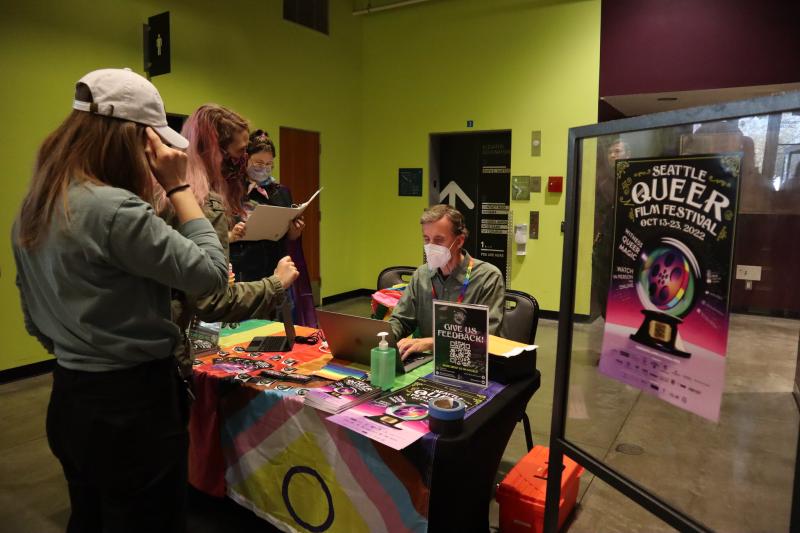ARP Grant Spotlight: Three Dollar Bill Cinema (Seattle, WA)

Seattle Queer Film Festival expanded its offerings this year to include 150 film showings from 27 countries. Courtesy of Three Dollar Bill Cinema
At this year’s Seattle Queer Film Festival, filmmakers and audience members basked in what the film organizers called “queer magic.” The magic wafts through the air in the scent of popcorn, the sound of laughter during podcast recordings, and in discovering community. For some audience members, there is excitement in seeing reflections of their own stories shown on the silver screen for the first time.
The film festival is the signature event of Three Dollar Bill Cinema, a Seattle-based organization that aims to elevate the spectrum of queer stories to make the world more equitable and just. However, at the beginning of the pandemic, after nearly three decades of community involvement, Three Dollar Bill Cinema, which had relied heavily on private donations, struggled to make ends meet. Fortunately, the first-time NEA grant applicant became a first-time grantee, securing a $100,000 American Rescue Plan Grant from the Arts Endowment.
While Seattle Queer Film Festival is the cinema’s flagship event, the organization also hosts TRANSlations: Seattle Trans Film Fest each year. One of only nine trans-focused film festivals in the world, the festival showcases films by, for and about trans, non-binary, and gender non-conforming people.
Three Dollar Bill Cinema also serves the next generation with its Reel Queer Youth program. The educational program serves queer youth 13-18 years old interested in filmmaking. It provides a space for youth to learn about the filmmaking process, channel creativity and explore their passions.
This federal investment helped Three Dollar Bill Cinema fulfill its payroll obligations and hire a marketing and social media manager who has been instrumental in expanding the cinema’s audience, both virtually and in-person.
For the past 27 years, the film festival has provided an opportunity and place for queer artists to share their stories with the world. True to its name, the festival features queer stories, from coming-of-age romances to supernatural comedies, and documentaries on activism. This past year, the event featured 150 films from 27 different countries, many of which received high audience ratings and had engagement from many different groups of attendees.
“The importance of representation on screen really cannot be overstated. During the pandemic, our film submissions were cut in half, so to be able to bring this film festival back in a hybrid way and to reach more people because of that virtual component has been really rewarding,” said Brewton. “This is all about building community, and you can’t really do that in a dark theater, so we also have more than just films.”
“In the past several years, I’ve really seen how much our audience has grown and changed. It’s made us be more accountable to the different needs of different groups. We’re reaching more BIPOC (Black, Indigenous, People of Color) folks, and folks with disabilities, trans folks, and they all deserve to feel like they belong in this community,” said Brewton, who is also careful to make sure he doesn’t speak to the needs of a group without their input. “Everything we do we make sure we have someone from that community programming for that audience. We want it to be authentic and in-community.”
Along with its screenings, the festival also hosted parties, zine workshops, and an art gallery. Opening night saw burlesque dancers before the world premiere of What the Funk?!, a documentary about a BIPOC burlesque festival that took place in Seattle. On the film festival's last day, stand-up comedians told jokes before a screening of (LOL)GBTQ, a compilation of comedic short films.
“Every few weeks you hear something about the future of gay rights in our country, and that is scary to navigate alone. We need safe spaces for queer folks to connect with each other and experience joy. We need wider audiences for our stories, so that more can witness our struggles and our successes,” said Brewton.




